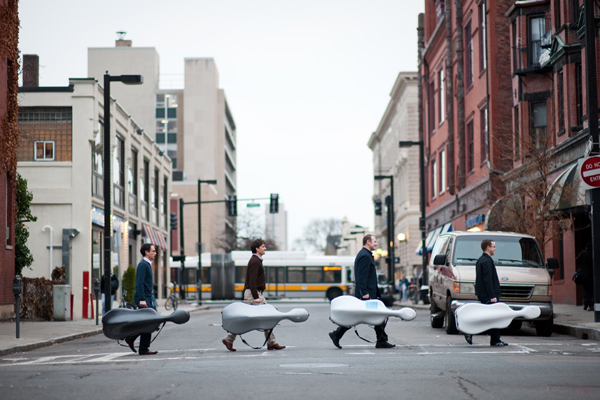Boston Cello Quartet to Debut First Album Pictures

From left: Adam Esbensen, Alex Lecarme, Mihail Jojatu, and Blaise Dejardin. / Photos courtesy of the Boston Cello Quartet
After three years, countless hours of rehearsal, multiple shows at Tanglewood, opening for the rock band Train, and recording a video game soundtrack, the BSO’s Boston Cello Quartet has become internationally recognized as one of the most unique ensembles to emerge from a major symphony orchestra. On February 5, the group will release its debut album, Pictures, which will be available in stores and online.
The arrangements in the album vary from traditional classical music, such as The Marriage of Figaro and Humoresque, to contemporary, easily recognizable tunes. In doing so, listeners get a sense of what the Boston Cello Quartet is like in concert. Even the order of tracks reflects the group’s diverse repertoire. They switch gears frequently, following The Flight of the Bumblebee with Clair de Lune, and then revving things up again with the Overture of the Barber of Seville.
The final track on the album, Wolfgang Variations, arranged by Blaise Dejardin, is a medley of songs from many genres. What’s that? The can-can? The Jaws theme? 007? Some South American flair with Aquarela do Brasil? And of course, what seems to be everybody’s favorite, the blues section.
We recently spoke with each member of the Boston Cello Quartet individually to find out more about the group, their new album, and what’s next for the band of BSO brothers.
So how did four cellists decide to start the Boston Cello Quartet? It’s not like anyone sits around at the BSO, way too bored, nothing to do, right?
Mihail Jojatu: Yes, exactly, we didn’t have enough to do, haha. No, we are all in the cello section of the BSO. We were talking one day and Blaise said, “How about something completely different?” and that was it.
Adam Esbensen: Blaise and Mihail came to me to read through the music, then Alex read the spec music, and we instantly knew there was something there. Obviously we have a very full schedule at the orchestra, so we have to plan around concerts and work on our days off.
Three of the members—Blaise, Adam, and Alex—joined the BSO around the same time in 2008. All four founded the Boston Cello Quartet in 2010.
Alex Lecarme: We liked it so much we decided, “Let’s just put together a concert.”
Blaise Dejardin: That was our first concert, at Tanglewood.
Mihail: A few hundred people came, many from the BSO. We received a lot of support from colleagues. There was a standing ovation at the end.
So they all play cello. What’s the big deal? There are a lot of string quartets out there, right? Turns out arranging music for four cellos, as well as playing the different parts, is really difficult.
Blaise: With four cellos, you have to play at a much higher register than normal. It’s fun for us to be challenged. And we’re lucky to have talented cellists from the BSO.
Lots of things on the CD have not been done before—75 percent of the repertoire is original, including a jazz piece by Tetsuro Hoshii, who’s from Berklee College of Music. There are many new arrangements that have never been heard because the pieces have to be arranged specifically for four cellos.
The quartet has always had the idea of recording an album in their heads. A year ago, they started funding the idea mostly with their own money.
Adam: It’s been a long time in the making, getting the logistics together, taking time to build enough of a repertoire. The audience response at our live shows was always overwhelming, and people would ask after the shows if we had a CD.
We want to give listeners the experience of being at a live performance. There’s such a wide-ranging amount of stuff—we start with traditional classical pieces, and then we have more eclectic pieces with the pyrotechnics. We lift our legs up and down as we play the can-can.
Blaise: It’s very much about teamwork. We take turns being the lead and play musical chairs.
Adam: We actually stand up during concerts to change seats so someone else is “first chair.”
For these musicians, the Boston Cello Quartet is about having fun and getting the audience to have fun too. It has nothing to do with fame or fortune.
Alex: If you look at the culture of music these days, it’s very self-centered, even in a string quartet. But for us, we do care about the fans and try to bring a variety of genres to people. There is an amazing amount of money to be made, but we’re already at the BSO. For us, it’s not about the money.
The quartet infuses a lot of comedy into their live concerts. And each has a unique personality, not unlike your modern-day pop boy band. (Their CD cover is a play on the famous photo of The Beatles crossing Abbey Road.)
Alex: Yeah, I’m pretty outgoing, at least on stage. I can’t play with my nose stuck in the music. I like to communicate with my colleagues while playing.
Adam: I’d say Alex is the more outgoing and funny one. He’s constantly making faces at the audience. Blaise plays the harmonica during the blues section of the medley.
Mihail: Personality-wise, we are all different. Adam is more quiet, poised. Alex is very creative. Blaise, the youngest, is very spontaneous. He writes all of our arrangements. He’s always transcribing. I like to cook, so I guess I am the chef in the kitchen when we have parties. But I would say I am pretty shy.
Adam: There’s a part in the medley when Mihail screams out “Yeah baby!”
Mihail: Ah, yes, that’s true, I do shout out during the medley.
What’s in store next? Are there more albums to come?
Adam: We have all kinds of ideas. What’s nice about the quartet is that there are a lot of opportunities. We do engage the audience, and it’s a good tool for educating the elusive younger audience members.
Blaise: Later on the CD, we have jazz, tango, the medley. It’s a great gateway for someone new to classical music.
The release party for the Boston Cello Quartet’s first album is tomorrow at 7 p.m. at the Revere Hotel. Pictures will be available in stores and online February 5. You can also check out the BCQ on YouTube.


